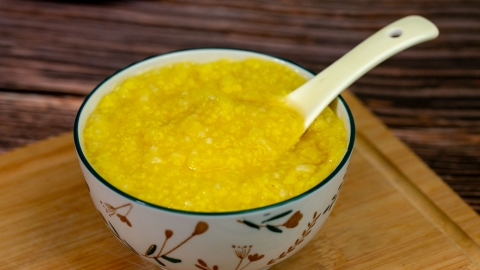What are the benefits and drawbacks of eating millet porridge during the postpartum confinement period?
During the postpartum confinement period, eating millet porridge has several benefits, including nutritional replenishment, improved digestion, support for lactation, gentle stomach nourishment, and mood regulation. However, potential drawbacks include limited nutritional variety, blood sugar fluctuations, possible aggravation of dampness, bloating from overconsumption, and reduced intake of other foods. The detailed analysis is as follows:

I. Benefits
1. Nutritional Replenishment: Millet is rich in carbohydrates, B vitamins, and iron. When cooked into porridge, it becomes easily digestible and provides energy for postpartum recovery, helping restore lost nutrients and gradually rebuild physical strength.
2. Improved Digestion: The soft, tender texture of millet porridge places minimal strain on the weakened digestive system after childbirth. It promotes intestinal motility, aids digestion, reduces the likelihood of postpartum constipation, and helps maintain stable bowel function.
3. Support for Lactation: Some women experience increased breast milk production after consuming millet porridge. When combined with other ingredients such as red dates or peanuts, it provides more comprehensive nutrition that supports breastfeeding.
4. Gentle Stomach Nourishment: The gastrointestinal lining is particularly sensitive after delivery. Millet porridge is mild in nature and does not irritate the digestive tract. Regular, moderate consumption can help protect the stomach lining, relieve postpartum gastric discomfort, and enhance digestive capacity.
5. Mood Regulation: Millet contains components that may help regulate the nervous system. As new mothers are prone to emotional fluctuations during confinement, moderate consumption of millet porridge may help stabilize mood and reduce anxiety or irritability.
II. Drawbacks
1. Limited Nutrition: Relying solely on millet porridge as a staple food over a long period may lead to insufficient intake of essential nutrients such as protein and fat, impairing comprehensive recovery and potentially causing nutritional imbalances.
2. Blood Sugar Fluctuations: Millet porridge has a relatively high glycemic index. For women with unstable postpartum blood sugar levels or a history of gestational diabetes, consuming millet porridge may cause rapid spikes in blood glucose, making glycemic control more difficult.
3. May Aggravate Dampness: Due to its high water content, excessive consumption of millet porridge may increase internal dampness in individuals with a damp-prone constitution or those experiencing postpartum edema, potentially worsening swelling or causing feelings of heaviness and discomfort.
4. Bloating from Overconsumption: Millet porridge contains dietary fiber. Eating too much may lead to excessive gas production in the intestines, resulting in bloating, belching, and reduced gastrointestinal comfort during the postpartum period.
5. Reduced Intake of Other Foods: Excessive consumption of millet porridge fills the stomach, leaving less room for other nutrient-rich foods such as meat and vegetables, which can disrupt overall dietary balance.
When consuming millet porridge during the postpartum period, moderation is key. It is advisable to pair it with eggs, lean meat, and fresh vegetables to ensure a balanced intake of nutrients. If adverse effects such as abnormal blood sugar levels or bloating occur, reduce or temporarily discontinue consumption, and consult a healthcare professional when necessary to adjust your diet plan and support healthy postpartum recovery.






